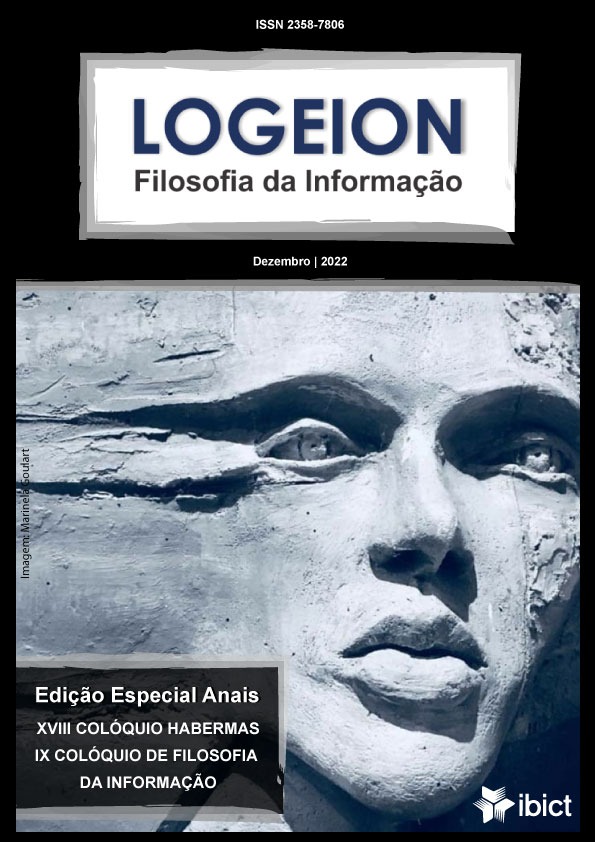Cultural screening
the effects of the cultural industry and the communicative action in law courses in Alagoas
DOI:
https://doi.org/10.21728/logeion.2022v9nesp.p132-151Keywords:
Fraud. Communicative action. Public policy. Law Courses.Abstract
This work highlights a reflection on public policies for access to higher education, highlighting the Law Course in the private network and the growing failure of students in the Brazilian Bar Association Examinations, under the effects of the Cultural Industry. It presents communicative action as an alternative for the emancipation of law students. In the first section we reflect on the crime of embezzlement. In the second section we focus on the thought of the Frankfurt School. We highlight Adorno and Horkheimer. These, as creators of the term cultural industry. Adorno states that the Cultural Industry leads everyone to see themselves as equals, on the same level. Habermas presents the communicative action as a basic element for the reconstruction of the emancipated man. In the third section, we reflect on the growth of Law courses in Alagoas and the practice of educational fraud, moving away from the democratization of access to the right to advocate under the influence of the cultural industry. The purpose of the Cultural Industry is to transform everything into consumable goods for society. Observing access to higher education in the Law Course in Alagoas, considering public policies for the democratization of higher education, the accelerated way in which the Ministry of Education has authorized the indiscriminate opening of Law courses in the State of Alagoas is worrying. This openness has justified the failure of students in Bar Exams. It is hoped that the text will awaken interested readers who can analyze the data from a Frankfurt point of view.
Downloads
References
ADORNO, T. Palavras e sinais: modelos críticos. Petrópolis: Vozes, 1995.
ADORNO, T. De larelacion entre sociaologia y psicologia. In: Actualidade de la filosofia. Barcelona; Buenos Aires: Paidós, 1955.
ADORNO, T. Educação e emancipação. Rio de Janeiro, Paz e Terra, 2000.
ADORNO, T. Tempo livre. In: ADORNO, T. Indústria cultural e sociedade. São Paulo: Paz e Terra, 2002.
ADORNO, Theodor. Educação e Emancipação. São Paulo: Paz e Terra, 2010.
ADORNO, T. A Educação Contra a Barbárie, Rio de Janeiro, Paz e Terra, primeira edição 2011.
BAKHTIN, M. Marxismo e filosofia da linguagem. Tradução de Michel Teixeira Wisnik e Carlos Henrique D. Chagas Cruz. 2. ed. São Paulo: Hucitec, 1981. (Originalmente publicado sob o pseudônimo de Valentin Nikolaïevitch Volochinov)
BITENCOURT, Cezar Roberto. Tratado de direito penal: parte especial. 7. ed. São Paulo: Saraiva, 2011, v. 3.
BRASIL. Código Penal Brasileiro. Organização dos textos, notas remissivas e índices por Juarez de Oliveira. 52. ed. São Paulo: Saraiva, 2021.
BRASIL. Exame de Ordem da OAB em números. Disponível em: https://www.oab-al.org.br/2020/04/exame-de-ordem-em-numeros-tres-instituicoes-de-ensino-superior-de-alagoas-se-destacam-em-estudo/. Acesso em: 28 jul. 2022.
BRASIL. Código Civil Brasileiro. Disponível em: http://www.planalto.gov.br/ccivil_03 /leis/l8906.htm. Acess em: 21 out.2022.
GRECO, Rogério. Código penal comentado. 5. ed. Niterói: Impetus, 2011.
HABERMAS, J. Conhecimento e Interesse. In: Escola de Frankfurt. Os Pensadores, XLVIII. São Paulo: Abril Cultural, 1975.
HORKHEIMER, Max & ADORNO, Theodor. A indústria cultural: o iluminismo como mistificação de massas. In: LIMA, Luiz Costa. Teoria da cultura de massa. Tradução de Júlia Elisabeth Levy, São Paulo: Paz e Terra, 2002.
HORKHEIMER, Max; ADORNO, Theodor. Os pensadores. 5. ed. São Paulo: Martins Fontes, 1991.
JAY, Martin. A imaginação dialética: história da Escola de Frankfurt e do Instituto de Pesquisas Sociais (1923-1950). Trad. Vera Ribeiro. Rio de Janeiro: Contraponto, 2008.
MARQUES, Samuel. Estelionato: Prática comum ao longo da história. Panorama Empresarial. Resende, 2009.
MATTOS, Daniel. Repensando o papel das marcas. Revista ECO-Pós, v. 6, n. 1, 2003.
MIRABETE, Júlio Fabbrini. Código penal interpretado. 4. ed. São Paulo: Atlas, 2003. p. 1348.
MIRABETE, Júlio Fabbrini. Manual de direito penal. 20. ed. São Paulo: Atlas, 2003, p. 304.
PRADO, Luiz Regis. Curso de direito penal brasileiro. Parte Especial - arts. 121 a 183. V. 2. p. 523. Ed. Filiada. 2002.
Downloads
Published
Issue
Section
License
Copyright (c) 2023 Logeion: Filosofia da Informação

This work is licensed under a Creative Commons Attribution-NonCommercial-ShareAlike 4.0 International License.
The journal is published under the Creative Commons - Attribution - Noncommercial - Share Alike 3.0 Brazil.
The published work is considered collaboration and therefore the author will not receive any remuneration for this as well as anything will be charged in exchange for publication.
All texts are responsibility of the authors.
It’s allowed partial or total reproduction of the texts of the magazine since the source is cited.














